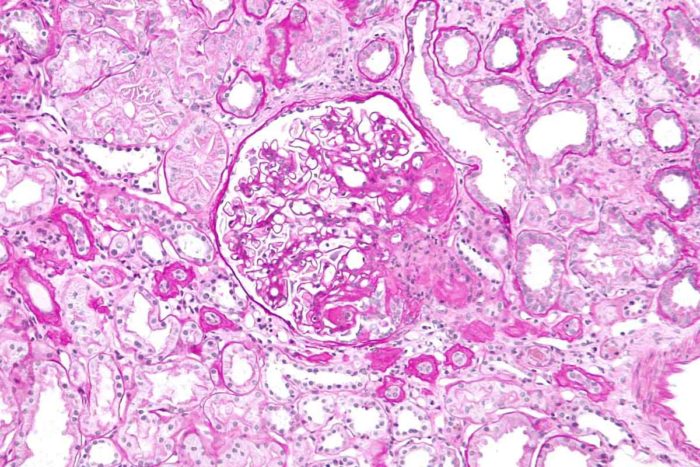Kidney research repository includes patient samples, clinical data
Washington University has established a sample and data repository for child and adult patients with kidney conditions to improve diagnosis and treatment

Kidney biopsy. Image courtesy of Wikimedia Commons.
Kidney disease is a leading cause of illness and death in the United States. Most cases are caused by untreated diabetes and hypertension but many others have a hereditary component and run in families.
With a long-term goal of improving diagnosis and treatment of a broad range of renal diseases, the Washington University School of Medicine Renal Division has established a repository of clinical information and biological specimens from more than 3,000 children and adults with kidney conditions. These include chronic kidney diseases, acute kidney injury, congenital kidney malformations and kidney transplants.
Scientists worldwide can request samples from the repository, part of the Washington University Kidney Translational Research Core, for their own research projects. The resource includes serum, plasma, blood, DNA and biopsy samples from patients, which can be analyzed to identify markers of various kidney diseases or genetic mutations linked to those diseases. The samples also can be used to identify disease markers associated with favorable or unfavorable outcomes. Demographic data and clinical information about diagnosis, treatment and medical and surgical histories also are available.
Assisting with research projects worldwide
The core assists investigators with their kidney disease research projects and can help with regulatory approvals for human research, processing and distribution of biological samples and patient recruitment. Core services have contributed to the work of more than 50 investigators worldwide and to more than 40 publications.
The repository was established in 2007 by a grant from the National Institute of Diabetes and Digestive and Kidney Diseases (NIDDK) and with additional funding from the Renal Division in Washington University’s Department of Medicine. The clinical information and biological samples included in the repository are de-identified, and most samples were donated by patients treated at Washington University, Barnes-Jewish Hospital and St. Louis Children’s Hospital.
“There has been a critical gap in resources like this for researchers studying kidney diseases,” said renal researcher Sanjay Jain, MD, PhD, associate professor of medicine and pathology and core director. “This incredibly valuable resource has the potential to lead to major advances in the understanding and treatment of a range of kidney diseases.”
The repository’s success stems from the support of patients and families, and from the joint efforts of adult and pediatric nephrologists, pediatric urologists, renal pathologists, bioinformaticians, house staff and research coordinators, Jain said.






